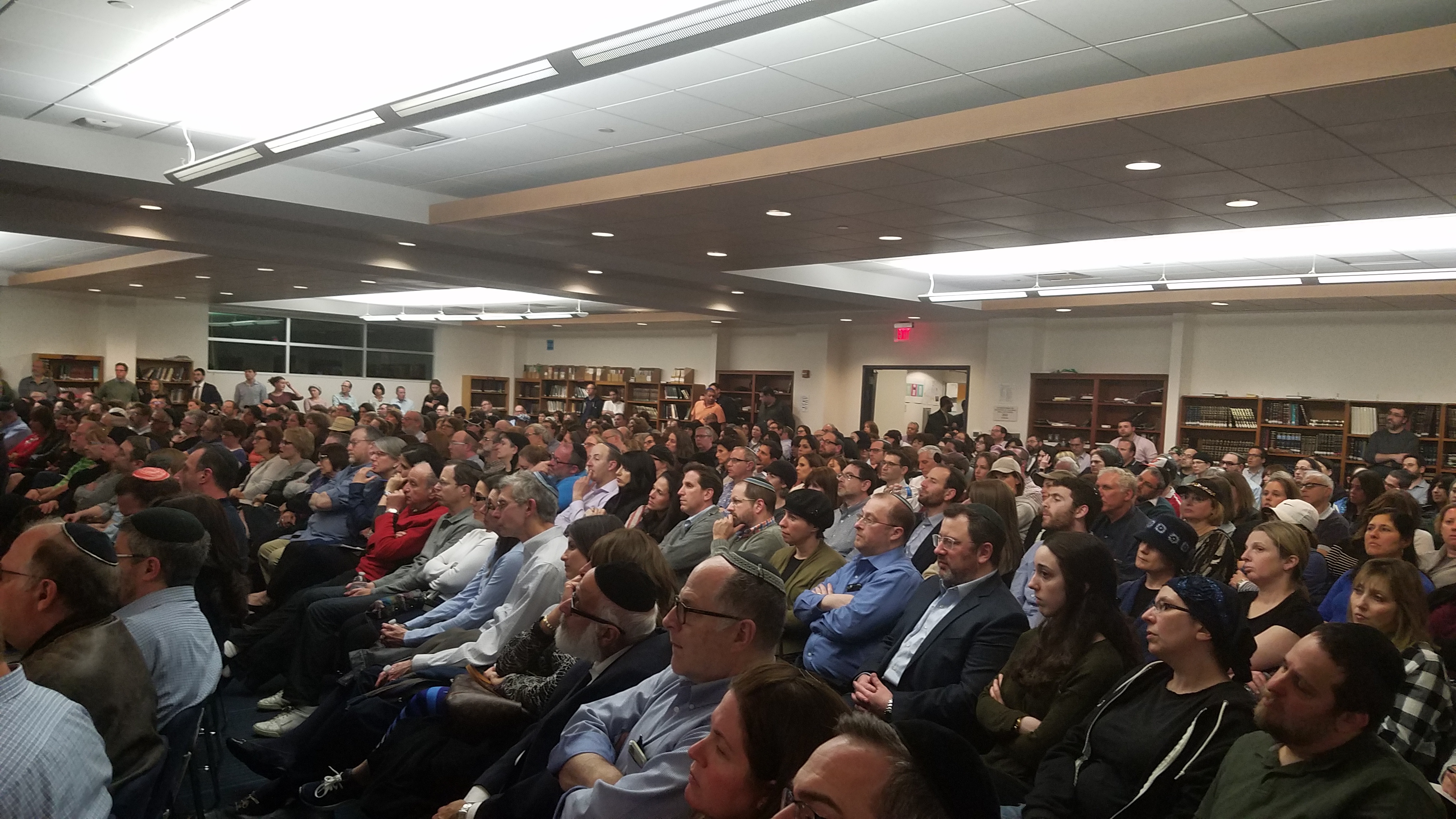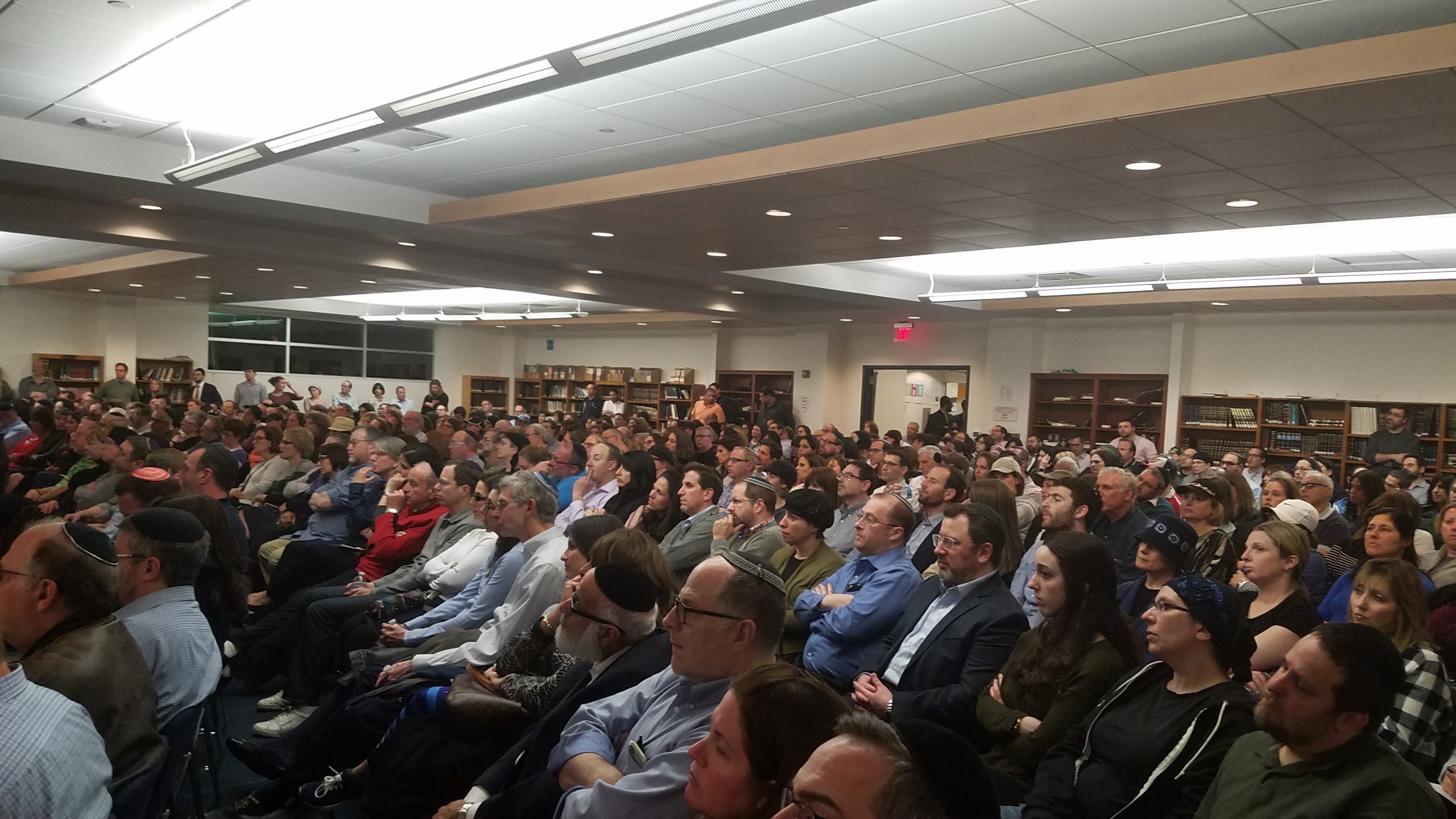 It’s a life-and-death situation, but we, as a community, can turn it around.
It’s a life-and-death situation, but we, as a community, can turn it around.
With clarity of message on Sunday night at TABC, the words of speaker after speaker penetrated the standing-room-only crowd of parents, teachers, school heads and community rabbanim. Speakers Rabbi Larry Rothwachs; clinician and addiction specialist Avi Shteingart; Ezy Finkel, a survivor of substance abuse; Amudim founder Rabbi Zvi Gluck; and Etiel Forman, a parent and the organizer of the event, all told their part of the story, from their various unique perspectives.
While complex and fraught with stigma, the challenge and its solution are somewhat simple to explain: By acknowledging that substance abuse and addiction is an illness and that there are those in our community who are fighting it, we as a community can begin to help those struggling. By acknowledging the scourge of addiction, we can help those facing alcohol or substance abuse challenges because they live inside a community that acknowledges the difficulty of their struggle. When we treats this illness as a disease, not as a taboo-topic, we can more actively help our friends and neighbors get the resources they need.
Forman, who organized the event hosted by Amudim, said if the event helped one person come forward and get help, it would, for him, have been a success. He noted that the advance publicity for the event had already resulted in 15 calls from families reporting similar experiences, so he already considered the goal as having been reached. Noting that he never imagined the room would be so full, he thanked that the community’s five high schools, all the community shuls and even the local middle schools, noting that a total of 26 community institutions had immediately partnered with his family to publicize and attend the event.
Forman described students struggling with substances as young as 13, such as his daughter Elana Forman, now 23, who has come forward, along with her father and mother, Lianne, to be a resource to anyone who is struggling. Her life’s path shows that anyone, even a top student and beloved daughter, can become easily addicted to substances, from cigarettes to vapes to alcohol, to marijuana, to cocaine and opioids, including heroin. Her father shared that her isolation, or inability to talk to even her family about her addiction initially, contributed to its worsening. View Forman’s full presentation here.
A Survivor’s Story
Ezy Finkel, a survivor of addiction from Lakewood, who serves as a resource and supporter to others fighting the disease today, shared his story, indicating that being invited to speak at such an event was the flip side of a terrible theme that followed him through the first part of his life. “I was invited to leave. I was invited to leave schools, I was invited to leave jobs, I was invited to leave parties. I was invited to leave marriage. And today I’m invited to come and share my experience, strength and hope. Who would have ever thought that being holed up in crack houses, abandoned buildings, institutions, getting beaten, [I] would one day be able to help another person?”
Finkel shared that he completed the initial detox part of his treatment by “using resentment,” through the wish to prove others wrong. “The only reason I went to treatment was because people said ‘Ezy’s never going to get better. He can’t. It’s impossible for him.’ And I said, really? I’ll show them. It didn’t help me for long, but it helped me get there.” He described packing up his bags every day hoping to conclude his treatment, only to realize, repeatedly, that he had hurt so many people and had so few resources, that he had literally nowhere to go.
Finkel described his watershed moment in group therapy that he doubted anyone else would remember, a moment where he became aware that he needed to plan for his life after treatment, truly reacting to the messages he was receiving. All that was said was something simple, by the group therapist. “When you get out, what are you going to do?”
He described internalizing the question and taking responsibility for those he had hurt. He described how his life was before rehab and how he did not want to return to his previous life, when had been unable to simply go out and buy diapers for his baby son, recalling that he had arrived home from that particular errand two days later.
Finkel’s end to the story included his finding of a sponsor who shared his experience of addiction to a tee, an African-American man named Carl, who showed him how God is present in our world in either everything or nothing, and taught him to view God as a loving father. Faith in God, though he had run from it as a youth, was what saved him. It wasn’t the ‘you’re going to Gehenom,’ God he had faced in yeshiva, while gripped with the effects of addiction, but a loving and forgiving God who brought beauty to the world. View Finkel’s full presentation here.
What is Amudim?
Rabbi Zvi Gluck, founder of Amudim, an organization that provides resources, references and support of all kinds to those struggling with addiction, as well as their families, said his goal is to eradicate addiction from the Jewish community. It’s an illness that can be treated, he said. Gluck took inspiration from Rabbi Josef Ekstein, founder of Dor Yeshorim, a Jewish genetic screening organization that took great risks beginning 30 years ago to encourage others to be screened against an array of fatal Jewish genetic diseases. Rabbi Gluck shared that Ekstein’s work successfully eradicated Tay-Sachs from the community in one generation. “I don’t know if we can have the same success, but I know we have to try,” said Rabbi Gluck.
Rabbi Gluck also shared a story of doing an intervention with a woman in her 40s, who initially protested going to treatment for addiction because she was afraid the news would get out and her children would not get a shidduch. She said she would rather die suddenly of an overdose and have it be passed off as a medical event because that would be more acceptable for her children’s prospects, he related. He noted in this case the enormity of the stigma, and the importance of valuing life and survival over outside appearances.
Another concern Rabbi Gluck highlighted is how addictive vapes are, and what a risk they are for teens. He noted how much nicotine they contain, even though they are packaged as a “healthier alternative” to cigarettes. He said that may only be true in cases where someone is already a smoker and is using vapes to reduce nicotine consumption. “What we’re seeing in high schools now is the flooding of adolescent brains with nicotine, which is leading to addictive behavior. This is the age of development and they’re putting in the most addictive substance the brain will ever come into contact with—nicotine—at rates we’ve never seen before.”
Rabbi Gluck shared a concern he had based on what a therapist had told him. The therapist “was sitting with a kid who was vaping while they were talking, and he said to the kid, ‘you’re vaping way too much, this is ridiculous.’ And he said, ‘I don’t even realize it, it’s so common, I’m just doing it. As a matter of fact,’ the kid tells the therapist, ‘A few weeks ago I was watching a movie with some friends and I was vaping the entire time while I was there, and when I got up, I was dizzy and I threw up.’ The therapist looks at him and said, ‘You realize your body just had an adverse reaction to vaping, which is the first step to an overdose. On vaping! Do you realize how bad that is?’”
Finally, Rabbi Gluck noted that it was very important that families looking for the right treatment find the right one by doing the proper research or asking Amudin for help. “Help for those suffering does not have to cost thousands of dollars. As a matter of fact you can do it for free or close to nothing,” he said, noting the prevalence and availability of twelve-step programs, both for those facing substance abuse and for their family and friends. “That doesn’t mean that there aren’t going to be those cases that do cost money, and it doesn’t mean there aren’t going to be situations that warrant it.”
“All too often, we at Amudim are meeting with families who have been through three, four, five programs; bankrupting themselves just to find out that the first three or four programs made no sense for what their loved one was going through.” View Rabbi Gluck’s full presentation here.
A Step Forward
In our paper last week, and again at the event on Sunday, Rabbi Larry Rothwachs indicated his hope that the community awareness event would be a step forward for the community in assisting others facing the challenge of alcohol/substance abuse and addiction. He shared that better awareness of alcohol in the home, and how children watch adults interact with alcohol or other substances, is of foundational importance in stemming the tide of the epidemic.
Rabbi Rothwachs noted that rabbanim might not have specific experience in dealing with substance abuse, but what they do have that is relevant is exposure and access to the community, “which is what enables me to stand before you, as a representative of our community, look you straight in the eyes and tell you: we have a problem. The problem is real, it is widespread and it is growing. It is not imagined, nor contrived to satisfy some secondary agenda.” See Rabbi Rothwachs presentation here.
“Your presence this evening is a source of tremendous chizzuk and a sign of strength and communal maturity,” Rabbi Rothwachs told the assembled. “May הקב”ה assist and enable us to maintain the commitment, perseverance and resolve to restore health and healing to our entire community. May He grant us the courage and wisdom to offer reassurance, support, assistance, guidance and yes, even embrace, each and every member of our community. Even, if not especially, those who need it the most.”
Amudim has created a Bergen County help line at (201) 464-8000, and an email address, NorthernNJ@amudim.org, for anyone seeking assistance to call or email and get help. The full video of the Amudim community awareness event at TABC can be viewed here: https://www.facebook.com/amudimorg/videos/1793566794028638/.








